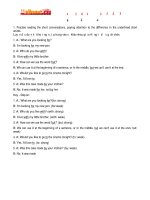Tải Giải bài tập SBT Tiếng Anh lớp 11 chương trình mới Unit 4: Caring for those in need - Lời giải sách bài tập Tiếng Anh lớp 11 Unit 4
Bạn đang xem bản rút gọn của tài liệu. Xem và tải ngay bản đầy đủ của tài liệu tại đây (139.27 KB, 11 trang )
Pronunciation - trang 26 Unit 4 Sách Bài Tập (SBT) Tiếng anh 11 mới
1. In each set, find the word in which the underlined vowel can be elided or pronounced
differently from the rest.
Trong mỗi bộ câu, tìm từ trong đó nguyên âm được gạch dưới có thể được đọc lướt đi hoặc phát âm
khác với phần còn lại.
1.
A. rarely
B. barely
C.scary
D. library
2.
A history
B. unforgettable
C. information
D opportunity
3.
A. deafening
B. frightening
C gardening
D encouraging
4.
A mobility
B. family
C. facility
D disability
5.
A. inference
B. prefer
C. underline
D afternoon
Đáp án:
1. D
2.A
3.D
4. B
5.B
2 Read the following sentences aloud and pay attention to the words with reduced vowels
before/l/,/n/ or/r/.
Đọc to các câu sau đây và chú ý đến những từ có nguyên âm giảm trước/ l/,/ n/ hoặc/ r/.
1.
2.
3.
4.
5.
You can charge your smartphone's battery in this library.
Mr Wood, who is an expert on contemporary Thai art, is reading a history book.
The police are questioning the family who received the threatening letter yesterday.
The cameramen should shoot the scenes separately.
Most teens think reading online is preferable to a visit to the local library.
Vocabulary & Grammar - trang 26 Unit 4 Sách Bài Tập (SBT) Tiếng anh 11 mới
1. Complete the following crossword puzzle.
Hoàn thành câu đố ô chữ dưới đây
Across
1.
the opportunity or right to use something
2.
relating to seeing
3.
sympathy, help or encouragement to someone in a difficult situation
4.
the ability to move easily
Down
5. intended or designed for a particular purpose or person
6. a chair with wheels that someone who cannot walk uses to move around
7. unable to use a part of the body or brain properly
8.
the state in which a part of a person's mind or body is unable to work well
Đáp án:
2. Complete the sentences with the words from the puzzle in 1. Change the word form, if
necessary.
Hoàn thành câu với các từ trong câu đố 1. Thay đổi hình thức từ, nếu cần.
1.
2.
3.
4.
5.
People with____________ impairments have difficulty climbing stairs.
This special school helps students with ___________ impairments to learn Braille.
Electric ___________ have been used more widely than manual ones.
We have launched various services to ____________ people with learning disabilities.
We have found ways to make the school building_____________ to disabled students.
Đáp án:
1. mobility
2. visual
3. wheelchairs
4. support
5. accessible
3 Complete the following sentences with the past simple or present perfect of the verbs in
brackets.
Hồn thành các câu sau đây với thì q khứ đơn hoặc hiện tại hoàn thành của các động từ trong ngoặc
đơn.
1. We ___________ (complete) a voluntary project for our community centre a month ago.
2. Since our last meeting, most of the students ___________ (become) more involved in volunteering.
3. Last week, the Youth Union leaders ___________ (decide) to launch a campaign to help children with learning
disabilities.
4. Many volunteers ___________(take) part in our programmes since the campaign was launched.
5. ___________ you_____________ (ever, help) students with special education needs?
6. Last semester my wheelchair broke down, so my best friend___________(carry) me on his back to school.
Đáp án:
1. completed
3. decided
2. have become
4. have taken
5. Have you ever helped
6. carried
4. Rewrite these sentences, using the words and phrases given.
Viết lại những câu này, sử dụng các từ và cụm từ cho trước.
1. We have worked on this programme for five years.
2.
3.
4.
5.
6.
7.
started, five years ago
Not long ago, teachers at the school for gifted students discovered that some of their students also have learning
disabilities.
have recently discovered
Our instructors have taught extra classes for students with learning disabilities since 2008.
began, in 2008
We created a resource room for talented students with learning disabilities in 2013.
have already created, since
Our school has used the same curriculum for both talented and challenged students since January.
started using, January
In 2010, our school introduced a special programme for students with disabilities.
have participated in, since
In 2011, we received the UNESCO charity award for the third time.
have won, three times
Đáp án:
1. We started working on this programme five years ago.
2. Teachers at the school for gifted students have recently discovered that some of their students also have learning
3.
4.
5.
6.
7.
disabilities.
In 2008 our instructors began to teach extra classes for students with learning disabilities.
We have already created a resource room for talented students with learning disabilities since 2013.
In January our school started using the same curriculum for both talented and challenged students.
Students with disabilities in our school have participated in a special programme since 2010.
We have won the UNESCO charity award three times (since 2011).
5. There is one verb in each sentence which is in the wrong tense. Find it and correct the mistake.
Có một động từ trong mỗi câu ở thì sai. Tìm và sửa lỗi.
1. So far we received 30 applications for the volunteering job.
2. Since 1 started working with disabled children, I read a lot about famous people with disabilities.
3. Albert Einstein has not been able to talk when he was two years old.
4. Beethoven was a famous pianist and has become deaf when he was 28.
5. Nguyen Phuong Anh has been honoured by UNICEF as a global oustanding child with a disability in
2013.
Đáp án:
1.
2.
3.
4.
5.
received —► have received
read —► have read
has not been able —► was not able
has become —► became
has been —►was
Reading - trang 29 Unit 4 Sách Bài Tập (SBT) Tiếng anh 11 mới
1. Read the text and choose the best answer (A, B, C or D) for each blank.
Đọc đoạn văn và chọn câu trả lời đúng nhất (A, B, C hoặc D) cho mỗi khoảng trắng.
Viet Nam Assistance for the Handicapped (VNAH) is a non-profit organisation (1) ________________
in 1991 to assist people with disabilities in Viet Nam. Its main aim is to help disabled people to
overcome their (2)_____________ . Some of VNAH's programmes (3 )___________ technical
assistance to clinics and wheelchair factories in the (4)___________ of high-quality and low-cost
wheelchairs.
To (5)____________ disadvantaged people, VNAH has set up the Office of Disabilities Technical
Assistance (ODTA) in Ha Noi. In addition, VNAH (6)________________ a programme to support the
government in improving activities benefiting people with disabilities.
In cooperation with the United States Agency for International Development, VNAH is now working to
(7)________________ different Vietnamese agencies. Special attention (8)_______________ to
providing disabled people with full access to all facilities and services.
1.
A find
B found
C.funded
D founded
2.
disabilities
B. abilities
C. disabled
D disablement
3.
A provide
B provider
C provision
D produce
4.
produce
B product
C production
D productivity
5.
A fund
B. assist
C donate
D. care
6.
A launches
B. launched
C have launched
D has launched
7.
suppose
B. supply
C support
D suppress
8.
was given
B is given
C are given
D were given
Đáp án:
1. D
2. A
3. A
4. C
5. B
6. D
7. C
8. B
2
Read the text and decide whether the following statements are true (T) or false (F).
Đọc văn bản và quyết định xem các câu sau đây là đúng (T) hay sai (F).
A Better Life for People with Disabilities
By KhaiTam Teenagers' Magazine
Last week the Youth Union leaders interviewed some volunteers who have worked with disabled
children. They asked them if attitudes and life for these people have changed. Here are some of their
responses.
‘I think there is more support for children with disabilities now,’ said Kevin, a grade 11 student. ‘There
are more special facilities and devices designed to enable people with mobility impairments to travel
around. There are also new forms of Assistive Technology that can help people with visual and hearing
impairments. So, I think disabled people can access more places and participate in more activities.’
Hung, the monitor of Class 10A, added, ‘Well, in terms of education, there are more special schools for
children with disabilities, even in developing countries. In addition, there are many schools where
disabled and non-disabled students are educated together. This has led to many benefits to both groups
and has reduced discrimination towards people with disabilities.’
When asked about her volunteer experience, Anna from Class 12B said, ‘My volunteer experience has
enabled me to understand children with disabilities and the support they need. It has also made me more
confident and helped me to realise the difference
I can make to other people's lives. I've also met a lot of talented people with disabilities who have
fulfilling jobs, live independently and contribute to the community.’
‘The most important thing is that society's attitudes towards people with disabilities have changed,’
Anna emphasised. ‘People can now join or watch events for athletes with disabilities such as the Far
East and South Pacific Games for the Disabled (the FESPIC Games), the Paralympics, or ASEAN Para
Games. Watching these events is inspirational as their achievements are amazing.’ She really likes the
FESPIC Games' motto: ‘Overcoming challenges, inspiring others’.
1. According to Kevin, there are now more ways to support people with mobility impairments.
2. Assistive Technology can only help people with visual impairments.
3. In Hung's opinion, educating disabled and non-disabled students in the same school leads to discrimination against
people with disabilities.
4. Anna has met people who have overcome their disabilities and are successful in their jobs and lives.
5. Anna thinks that international events for disabled athletes can make us better people.
Đáp án:
1.T
3
2. F
3. F
4. T
5.T
Read the text again and choose the best answer for the following questions.
Đọc lại văn bản và chọn câu trả lời đúng nhất cho các câu hỏi sau.
1. The word ‘devices’ in paragraph 2 refers to___ .
A equipment
B. methods
C. movements
D transportation
2. The word ‘motto’ in paragraph 5 means a phrase 4. used to
warn someone against something
B. advertise something
C. express the aims and beliefs of an event, organisation or person
D. instruct someone to do something
3. What can people learn from volunteering?
A. How to use Assistive Technology.
B. How lucky non-disabled people are.
C. How to make disabled people more confident.
D To understand people with impairments and be more confident.
.
4. The word ‘together’ in paragraph 3 means
A. in a close relationship
B. with each other
C. at the same time
D. in agreement
5. How can disability discrimination be reduced?
A. By not educating disabled students.
B. By educating disabled children with gifted students.
C. By educating disabled and non-disabled students together.
D. By providing more special schools for disabled students.
Đáp án:
1. A
2. B
3. C
4. C
5. D
Speaking - trang 31 Unit 4 Sách bài tập (SBT) Tiếng anh 11 mới
1. Put the responses into the appropriate blanks. Then practise the conversation with a partner.
Đặt câu trả lời vào khoảng trống thích hợp. Sau đó, thực hành cuộc trò chuyện với một người bạn.
Beth: Hello, Kevin. How are you doing?
Kevin: (1)_____________________
Beth: I'm OK. I just got back from theTexas School for students with visual impairments.
Kevin: Oh, what happened?
Beth: I attended a music class there. They are all very talented and look so happy. I felt ashamed of
myself. I often complain about my life while some people don't even have the same opportunities.
Kevin: (2)_____________________
Beth: I didn't know you have volunteered at that school. How often do you go to help?
Kevin: (3)_____________________
Beth: That'll be great. I'm thinking of making some cakes for the kids. Do you want to help?
Kevin: (4)___________________ . I'll ask her for some.
a. Sure. We can take some cupcakes to the kids. My mum has lots of recipes.
b. l try to do 2-3 days of volunteer work every month. Maybe we can go together next time.
c. Hi, I'm good. Are you OK? Are you crying? Your eyes are all swollen and red.
d. Yes, I felt the same when I first volunteered to help there.
Đáp án:
1.c
2.d
3.b
4.a
2. Work in pairs. Play the roles of Beth and Kevin in Activity 1 and continue the conversation by
making plans to help the disabled students. You can use the suggested guidelines below.
Làm việc theo cặp. Đóng vai Beth and Kevin trong Hoạt động 1 và tiếp tục cuộc trò chuyện bằng cách
lập kế hoạch để giúp đỡ học sinh khuyết tật. Bạn có thể sử dụng hướng dẫn được đề xuất bên dưới.
Making cakes
Who is going to help to make cakes?
What cakes are you going to make?
What ingredients are you going to buy?
How many cakes are you going to make?
Reading stories
What stories are you going to read?
Who is going to read the stories?
Do you want to share any storybooks with the students there?
Do you need to find the storybooks in Braille?
Do you need sound effects or any musical instruments?
Preparing a game show
What games are you going to play?
What kinds of aids do you need to prepare for the games?
Who is going to run the game show?
What are the prizes for the winners?
Gợi ý trả lời:
SI: Hey! Do you have a moment? I want to talk to you about our plan next week.
S2: Sure. I was about to call you. Thank you for sending the recipe. I've made a shopping list so we can
keep track of what we're going to buy. Here, take a look.
SI: Great. But we don't have to buy flour. There is some leftover at home from the last time my mum
made some cakes.
S2: Do you think 20 cupcakes will be enough?
SI: Of course. There are about 10 to 15 students in one class. We can even share some cupcakes with the
teachers.
S2: I also want to read some stories to the kids. I've found some interesting ones. Do you think we'll
have time?
SI: Yes, we'll have plenty of time. I'm going to bring some Braille storybooks as well.
S2: So let's go shopping on Thursday. You can help me with the cupcakes on Friday morning, then we'll
go to school together.
SI: OK. And I'll bring the flour and the books.
S2: That sounds good to me. See you on Thursday.
Writing - trang 32 Unit 4 Sách Bài Tập (SBT) Tiếng anh 11 mới
1. Write recommendations to improve accessibility for disabled people, using the words and
phrases given. Change the word forms, if necessary.
Viết khuyến nghị để cải thiện khả năng tiếp cận cho người tàn tật, sử dụng các từ và cụm từ được đưa ra.
Thay đổi hình thức từ, nếu cần.
1.
2.
3.
4.
5.
6.
improve/ home safety/ provide/ friendly environment/ disabled people/.
consider/ ways/ make/ day-to-day life/ easier/.
remove/ barriers/ stop/ disabled/ contribute/ the community/.
help/ people with disabilities/ engage/ hobbies/ activities/.
provide/ people/ hearing impairments/ with/ suitable/ hearing aids/.
change/ the way/ think/ act towards/ people in need/.
Gợi ý đáp án:
1.
2.
3.
4.
5.
6.
We should improve home safety and provide a friendly environment for disabled people.
We ought to consider different ways to make day-to-day life easier for people with disabilities.
We ought to remove the barriers that stop disabled people from contributing to the community.
We should help people with disabilities (to) engage in hobbies and sports activities.
We should provide people with hearing impairments with suitable hearing aids.
We need to change the way we think about and act towards people in need.
2 Read Nam's report about his visit to a special school. Identify a problem he mentions and
write your recommended solutions to it in the space below.
Đọc báo cáo của Nam về chuyến thăm của cậu đến một trường học đặc biệt. Xác định một vấn đề cậu đề
cập và viết các giải pháp được đề xuất của bạn cho nó trong khoảng trống dưới đây.
Yesterday morning, our school went on a visit to Hoang Mai special school in Ho Chi Minh City. When
we were there, we had a chance to meet students with different disabilities and join in school activities.
First, we talked with people with visual disabilities. Then we observed a class in reading Braille books.
We were told that there were not many books written in this system of raised dots. Then we met children
with hearing impairments. Their teacher taught us some basic sign language so that we could greet them.
We were told that hearing aids are very expensive and some parents can’t afford them. It was a useful
visit for our class. We have decided to start volunteering at the school, and I think we can all help these
children to learn skills and have a better life.
Problem___________________
Solution 1 __________________
Solution 2 __________________
Conclusion__________________
Gợi ý trả lời:
Problem
There were not many books written in Braille
Solution 1
Record some short stories on audio recording devices
Solution 2
Organise story-reading events
Conclusion
Volunteer students can record short stories and read stories for students with
visual impairments. This can provide more opportunities for children to enjoy different books.









